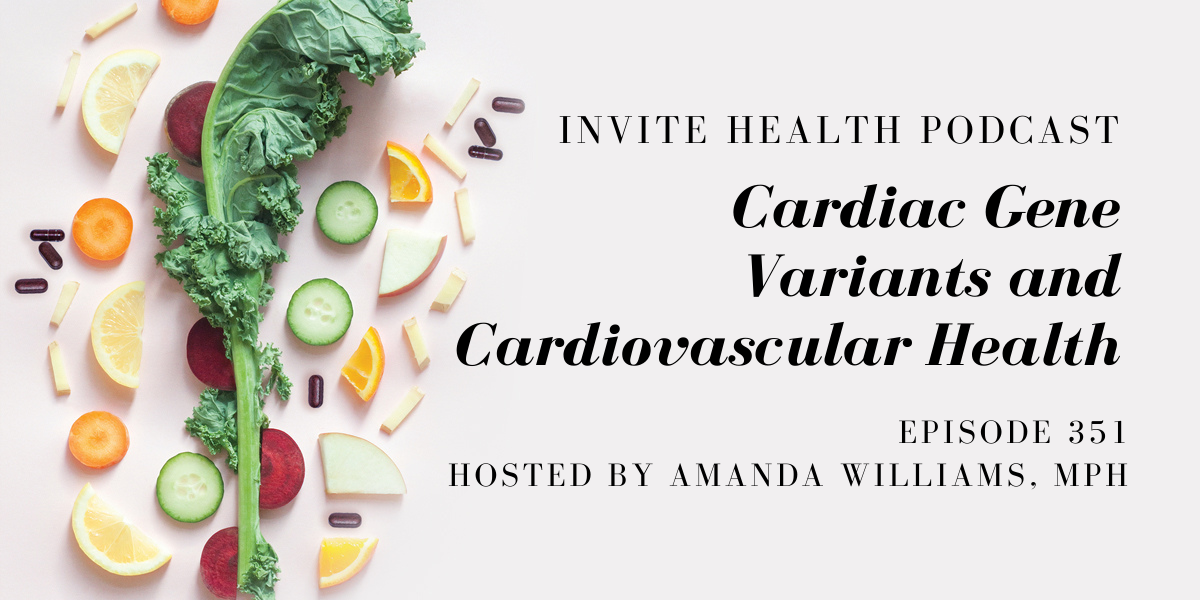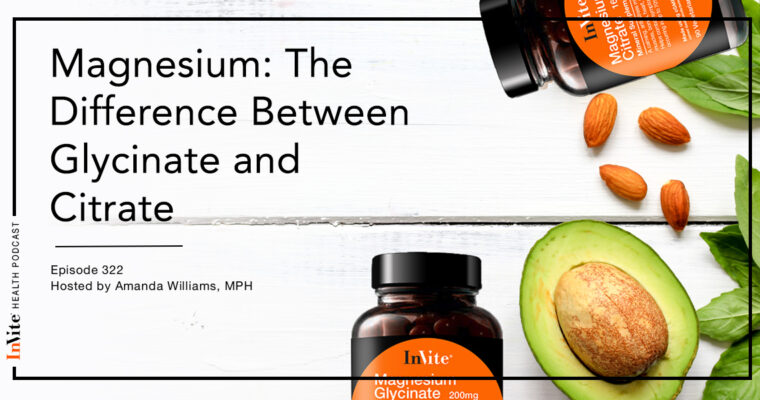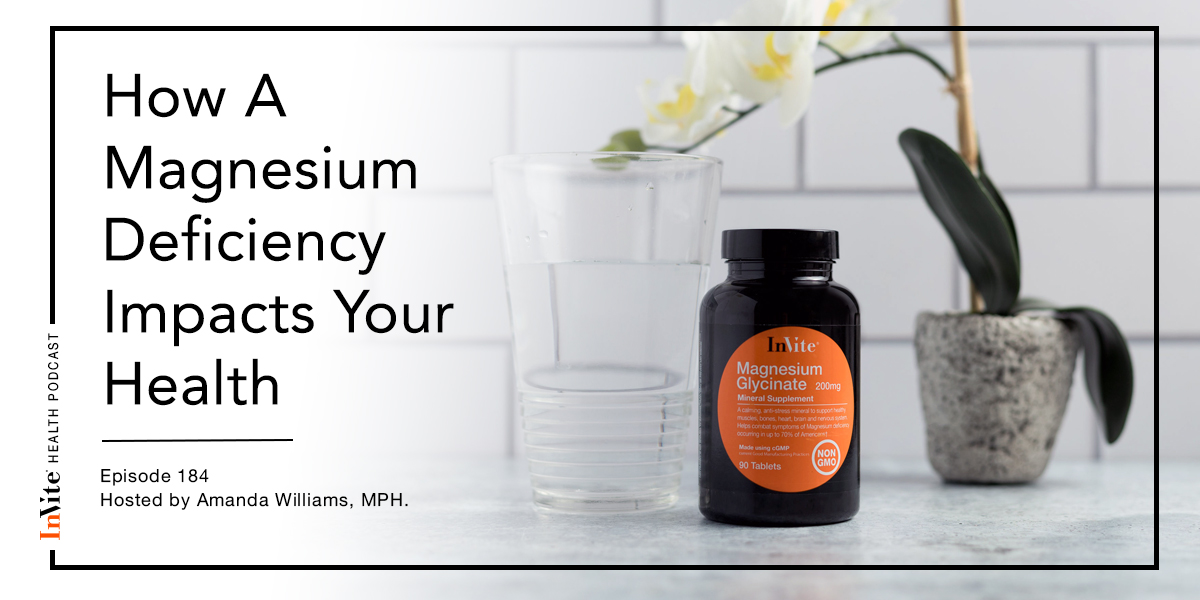Invite Health Podcast, Episode hosted by Amanda Williams, MPH
Subscribe Today!
When it comes to minerals, magnesium should be at the top of your list. Today, I’m going to talk about all the ways magnesium can impact our health. What we do know about magnesium is that the majority of Americans certainly do not obtain enough of it in their diet, which is leading to widespread magnesium deficiency throughout this country. We know that it’s estimated that anywhere from 50 to 75% of the US population falls into that category of being magnesium deficient. This can be really detrimental to your overall health, so I’m going to talk about all of the ways in which magnesium is utilized and why this simple mineral is so critical to the way our body functions.
Magnesium is required for the proper functioning of over 300 different enzymes in the body. It functions in terms of blood pressure regulation, heart rhythm stabilization, maintaining insulin sensitivity, and muscle contractions and relaxation in both smooth and skeletal muscles.
THE PROBLEM WITH MAGNESIUM DEFICIENCIES
A lot of different things can lead people into magnesium deficiency. Certainly we know that poor dietary intake related to the standard American diet can be one reason. We also know from the 2012 Journal of Water and Health that there was a direct correlation between low levels of magnesium and elevated blood pressure. Water purification techniques and the increased consumption of bottled water has led to a greater deficiency in magnesium worldwide. Magnesium levels being low in both food and water can explain why so many people are falling into that category of magnesium deficiency.
THE BASICS OF BONE HEALTH – INVITE HEALTH PODCAST, EPISODE 160. Listen Now >>
People who have chronic disease states and people who are aging are often more prone to magnesium deficiencies. For aging people, this can relate to shifting in their diet, as well as a more profound reduction when it comes to the absorption of magnesium within the intestines.
Magnesium deficiency at a minor level can cause major changes in how the heart and the blood vessels actually function. We can look at endothelial dysfunction, that’s how the cells that line those blood vessels are working. We can look at inflammation that occurs within the blood vessels themselves throughout the entire body. We can look at the abnormalities of heart rhythm, including different arrhythmias. Low levels of magnesium are also directly associated with higher levels of blood pressure readings.
When it comes to magnesium, your recommended daily allowance (RDA), for males is at least 420mg per day and for females 320mg per day. The RDA is generally always set very low. Generally speaking, one can conclude that the RDA amount is basically enough just for sustaining life and to keep you from being completely deficient, but we know that many people require higher levels. Oftentimes people will ask me how much magnesium they should be taking in per day, and it really varies. For some people, taking 400mg per day will work, and others will find that they’re taking well over 1000mg.
What we do know about magnesium is that the majority of Americans certainly do not obtain enough of it in their diet, which is leading to widespread magnesium deficiency throughout this country.
Different medications can also lower your magnesium. Any of the diuretics that people often take with medications for high blood pressure can lower your magnesium levels. This includes thiazide diuretics and loop diuretics and things such as hydrochlorothiazide and Lasix. Certain blood pressure medications, such as beta blockers, can potentially lower your magnesium levels.
Magnesium is not just associated with cardiovascular health. There has also been association between a greater magnesium intake, from both food and supplementation, and a decreased risk of fractures. There was a study where researchers were looking at men and women developing fractures over an 8 year time period. They found that the men and women who had the highest magnesium intake had a significantly lowered risk of having a fracture.

Magnesium is going to help promote proper electrical conduction. So many people get put on anti-arrhythmic medications or on blood thinners because of issues like atrial fibrillations. If you also have magnesium deficiency, you are making your heart struggle in terms of proper electrical firing. The heart itself is running on this electrical circuit that relies on magnesium. So if we don’t have magnesium because of dietary intake, medications, and bottled water, what do we think is going to happen? This is why magnesium is so critical to our overall health.
Let’s look at the different foods that contain magnesium. This is where the problem really comes in. The average American is not obtaining foods like seeds, nuts, and spinach, all of which contain a really high amount of magnesium, when they go through the drive-through. For more research on the importance of magnesium, make sure to tune into the full podcast episode by clicking PLAY above.
If you realize that you’re not eating things like seeds and nuts every single day and you’re bottled water on a regular basis, supplementation with magnesium would be advantageous. There are many different forms in which you can supplement with magnesium. There’s magnesium citrate and magnesium glycinate. Oftentimes I will find that magnesium citrate has a tendency to absorb a little quicker, which is good if someone has more of a tendency to have abnormal bowel functions. If someone is experiencing issues with abnormal heart rhythms, as well as skeletal muscle contractions like cramping in your legs, magnesium glycinate can be beneficial.
NUTRITIONAL SUPPORT FOR WOUND HEALING – INVITE HEALTH PODCAST, EPISODE 146. Listen now! >>
When it comes to magnesium intake, we are failing as a nation. Actually, we are failing worldwide. Just having adequate magnesium can do so much in terms of enhancing the body’s ability to maintain health and wellness. It is really quite essential to recognize that magnesium deficiencies and their direct correlation to all of these chronic disease states can be so much better controlled and regulated if we start to take in magnesium as part of our daily diet and supplementation routine.













